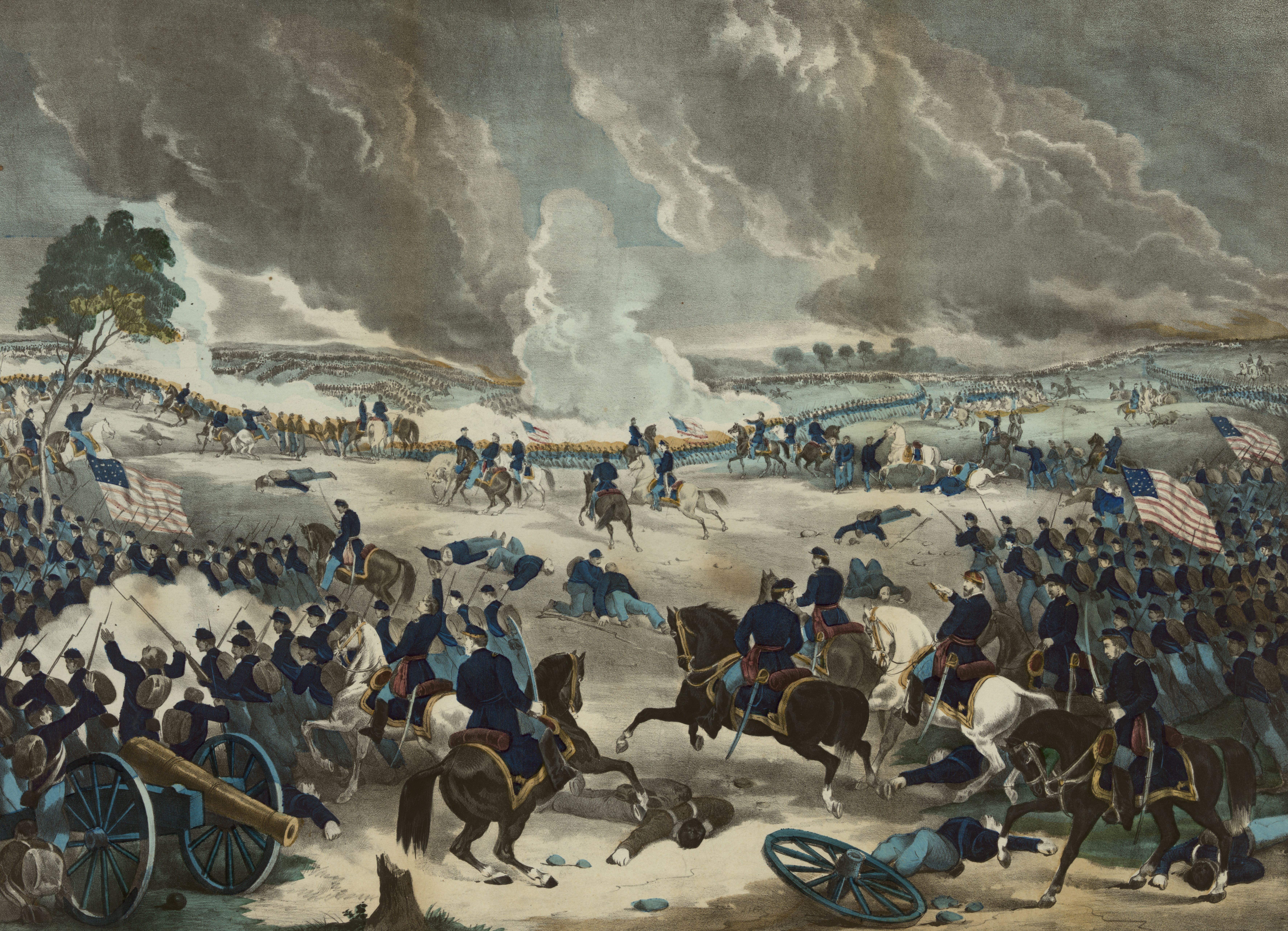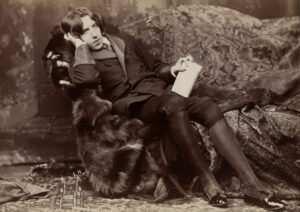In his 1892 book, Specimen Days and Collect, Walt Whitman famously questioned the efficacy of writing a comprehensive account of the Civil War. “Future years,” the poet mused, “will never know the seething hell and the black infernal background of countless minor scenes and interiors….The real war will never get in the books.” To Whitman, who tended to wounded soldiers in Washington-area hospitals, the conflict was at once too epic, too personal—and too horrific—to ever find suitable expression in prose. The best an author could hope to do, Whitman concluded, was offer “a few stray glimpses.”
The country’s bloodiest war has been captured in novels, memoirs, and battle narratives.
Yet since Whitman penned those words, the Civil War has become one of the most documented events in American history. Writers working in every genre imaginable (see Seth Grahame-Smith’s Abraham Lincoln: Vampire Hunter, in which the Rebels are bloodsuckers) have pored over the conflict for strategy, inspiration, romance, tragedy, or just one hell of a good story.
We surveyed historians and aficionados to identify the foremost Civil War classics. Although the following list is far from definitive—the Great Civil War Read turns out to be as elusive as the Great American Novel—these “stray glimpses,” taken together, provide a striking portrait of a war that continues to court writers.
Here are 10 classics:
Personal Memoirs of U. S. Grant
By Ulysses S. Grant
When Grant set about writing his account of Union victory, he was in many ways a defeated man. Weakened by cancer and on the brink of financial ruin, he dug into the one reserve that time hadn’t ravaged, his own story, and emerged with a doozy that set the record straight and replenished his family’s fortunes. Grant’s chronicle, completed just before his death in 1885, often bristles with suspense and is leavened by dashes of gallows humor. “Ifs defeated the Confederates at Shiloh,” he writes. “There is little doubt that we would have been disgracefully beaten if all the shells and bullets fired by us had passed harmlessly over the enemy and if all of theirs had taken effect.”
The Civil War: A Narrative
By Shelby Foote
As exhaustive a rendering of the military history of the Civil War as any ever attempted, Foote’s 2,968-page, 1.2-million-word account (published as three books, in 1958, 1963, and 1978) is also the most absorbing. Casting his hawk’s eye on major battles, minor skirmishes, and nearly every musket firing besides, Foote acts as an evenhanded, omnipresent narrator whose voice, warm and fanciful, is that of a Southern raconteur equally versed in Faulkner, Tacitus, and the King James Bible.
Nowhere are his powers more on display than in his evocation of Confederate lieutenant general Nathan Bedford Forrest’s lone-wolf assault at Fallen Timbers in Tennessee. “As he came out of the mass of dark blue uniforms and furious white faces, clearing a path with his saber,” Foote writes, “he reached down and grabbed one of the soldiers by the collar, swung him onto the crupper of the horse, and galloped back to safety, using the Federal as a shield against the bullets fired after him.”
Battle Cry of Freedom
By James McPherson
It is fitting that McPherson’s one-volume 1988 treatment takes its title from a song, since it harmonizes narrative with analysis and polemic. Whereas Shelby Foote is content to let battles speak for themselves, McPherson’s purview is wider, panning the social, economic, and political landscape on both sides of Fort Sumter.
This exercise in contextualization, a truly virtuoso performance, leads to fascinating insights (the role of measles and mumps in early Confederate defeats in the Eastern theater) and provocative verdicts (that Union victory was far from a shoo-in), all of which lend credence to McPherson’s central theme. The Civil War, he suggests, was a landmark fray in the nation’s ingrained struggle for freedom—or, more specifically, its struggle to hammer out what “freedom” actually entails.
The Red Badge of Courage
By Stephen Crane
A generation removed from Antietam, Crane, a journalist, had never seen war, let alone fought in one, yet he had interviewed enough Civil War veterans to know that much of the fiction inspired by it, awash in heroes and tales of undaunted valor, owed more to Greek myth than human experience.
In 1895, with Red Badge of Courage, Crane introduced a new breed of Civil War protagonist in Henry Fleming, a young Union private whose capacity for cowardice, doubt, fear, and self-preservation is bested only by his bondage to circumstance. Crane penned the novella in 10 frantic nights when he was 21 years old, but the prose, which Ernest Hemingway cited as an inspiration, feels neither slapdash nor naive.
Limning the interior life of Fleming, from his battlefield desertion to his flag-bearing redemption at a Confederate rout that strongly resembles Chancellorsville, Crane testifies to that most basic of truths about war: that it is fought by men in the throes of torment.
R. E. Lee
By Douglas Southall Freeman
Hero worship? Maybe. But after reading Freeman’s 1934 four-volume portrait of Confederate general Robert E. Lee, you will be hard-pressed not to bow your knee, or at least tip your cap. Freeman’s Lee is a tactical wizard, an equable commander, a gentleman who makes time for prayer and letter writing, and, despite numerous setbacks, a paragon of resilience.
But his most abundant trait, the one that inspires fidelity among his ranks but arguably costs him the war, is confidence. One soldier, speaking in the summer of 1862, remarked of Lee, “He will take more desperate chances, and take them quicker than any other general in this country, North or South.”
Gettysburg
By Stephen Sears
Few clashes in history—think Waterloo or Thermopylae—are as shrouded in mystique as Gettysburg. Stephen Sears’s rip-roaring 2003 study of those three days in July 1863 shows that, whatever role the Fates may have played, the outcome was, at root, a classic case of careful war planning trouncing recklessness. The book, like the battle, crescendoes with “Pickett’s Charge,” a 50-page chapter that moves at a bullet’s pace. “The thunder and crash of the cannonade died away, and seemingly on cue, as if the god of battles were stage-managing the scene, a light breeze sprang up and gradually carried away the clouds of smoke obscuring the battlefield,” it begins. “It was like a curtain rising, and the sheer magnitude of the sight revealed took breaths away. Involuntarily, all along the Yankee line, came the cry, ‘Here they come!’”
Military Memoirs of a Confederate
By Edward Porter Alexander
Like commentary from a reliable sports analyst who’s a former player, Edward Porter Alexander’s 1907 appraisal of Confederate tactical triumphs and travails is made all the richer by the author’s personal experiences as a Rebel officer. A skilled engineer and artillerist, Alexander served under Generals Beauregard, Johnston, Longstreet, and Lee, coordinating the flow of arms and ammunition in such major battles as Second Manassas and Fredericksburg. True to his instincts, Alexander attests to the principal role that cannons, blazing or idle, uproarious or ordered, played in the fracas.
“But no compromise,” he writes of Confederate missteps at Fort Sumter, “is ever possible after the firing of the first gun. There is in it some quality which stirs the human heart as nothing else can do….For blood is thicker than water, and were it not so, the development of nations would often prove painfully slow.”
A Stillness at Appomattox
By Bruce Catton
Catton’s chilling 1953 account of the final year of the Civil War begins warmly. The Union’s II Army Corps, camped on the banks of the Rapidan River in Virginia, is holding a dance in celebration of George Washington’s birthday. Hauled in from nearby Washington, women in “hoop-skirted party gowns” waltz with Union officers in a pine ballroom. The night’s charm seems to spill over into Major General George Meade’s war room, spawning a starry-eyed plan to pass out pamphlets offering amnesty to turncoats in the Confederate capital. By chapter’s end, the maimed and pilfered body of the young Union colonel in charge of the mission is on display in a Richmond train station. A master at creating suspense through dramatic juxtaposition, Catton bears out the war’s bitter deterioration all the way to Appomattox, where as Grant trots past the ashen, surrendered ranks of Rebels, a band plays “Auld Lang Syne.”
Lincoln, the War President
Edited by Gabor S. Boritt
Books about Abraham Lincoln are a genre all their own. A quick Amazon search turns up some 18,000 with Lincoln’s name in the title. Lincoln the writer, the husband, the enigma, the comeback kid—writers have spilled ink on all of them, yet few have surveyed Lincoln the commander in chief. For the best overview on the topic, the essays in Gabor S. Boritt’s 1992 Lincoln, the War President—including offerings from James McPherson, Arthur Schlesinger Jr., and Carl Degler—are a fine place to start.
In these pages, Lincoln emerges as a reluctant hawk who, once converted to the war cause, becomes an ardent student, a keen national strategist, an iron fist in the way of Bismarck, and a man who wagers the integrity of the executive branch and his own blood, sweat, and repute on ensuring nothing less than the unconditional surrender of the Rebels.
Decision in the West: The Atlanta Campaign of 1864
By Albert E. Castel
The South aimed to win the Civil War by outlasting the North, by fighting until the other side despaired of fighting. In his 1992 Decision in the West, Albert Castel taps Union major general William Tecumseh Sherman’s slow-burning defeat of the Army of Tennessee at Atlanta in 1864 to unmask that plan’s tragic flaws, chief among them a denial of the Federals’ numerical and materiel advantages which, when harnessed by a shrewd and long-suffering tactician such as Sherman, all but ensured defeat. Castel also faults the Southern public and Jefferson Davis for sacrificing soldiers to salvage turf. “To them, as to him, the Confederacy was its land and its cities, which had to be defended to the utmost,” Castel writes. “When it became manifestly impossible to defend them any longer, the Southern will to go on with the war collapsed.”
Suggestions From MHQ Readers
James Winkler, Evanston, Ill.
• Mr. Lincoln’s Army and Glory Road, by Bruce Catton
• Confederates, by Thomas Keneally
• Lee’s Lieutenants, by Douglas Southall Freeman
• The Ordeal of the Union, by Allan Nevins
• Lincoln at Gettysburg, by Garry Wills
• Lincoln’s Sword, by Douglas L. Wilson
• Abraham Lincoln: The War Years, by Carl Sandburg






